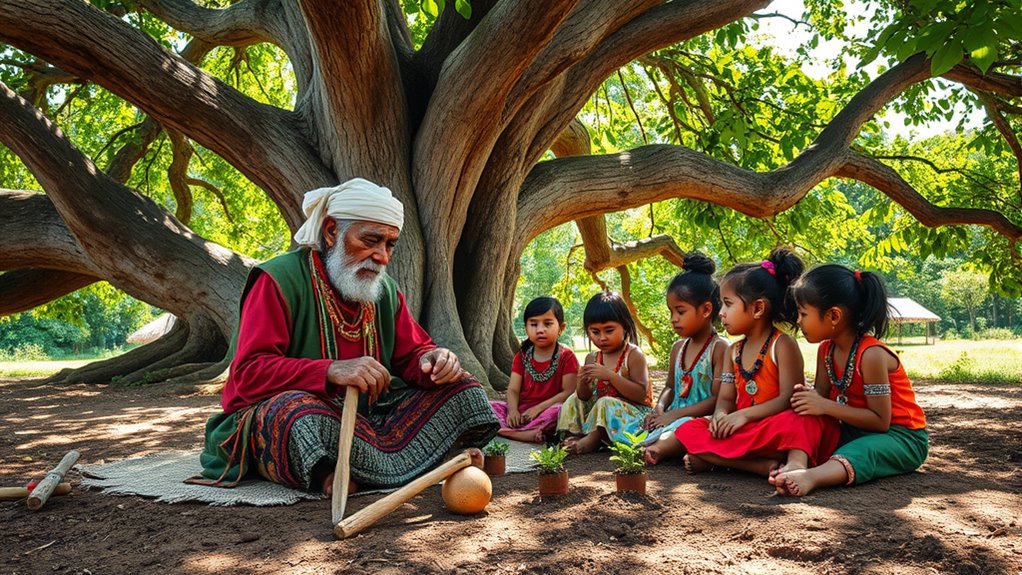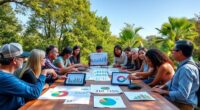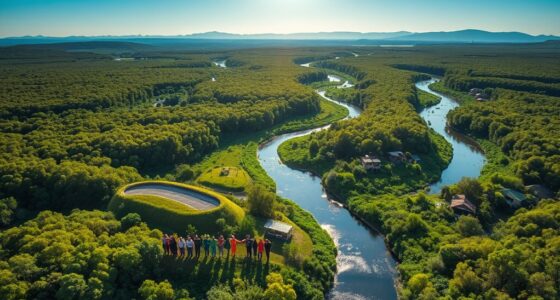Indigenous knowledge uses oral traditions to pass down sustainable practices and ecological wisdom that have supported communities for generations. You’ll find that storytelling, songs, and rituals encode lessons about hunting, farming, and conservation, emphasizing a deep connection with nature. These traditions also reinforce cultural resilience and shared responsibility for the environment. If you want to explore how these timeless lessons shape modern sustainability efforts, there’s much more to discover below.
Key Takeaways
- Indigenous oral traditions encode ecological wisdom, guiding sustainable hunting, gathering, farming, and conservation practices.
- Stories and rituals reinforce a worldview that humans are part of a larger, interconnected ecosystem.
- Community-led knowledge transmission fosters collective responsibility for environmental stewardship.
- Resilience in maintaining cultural practices ensures the survival of traditional environmental knowledge.
- Valuing indigenous knowledge systems offers holistic insights vital for addressing modern sustainability challenges.

Have you ever wondered how indigenous communities have preserved their knowledge through generations? The answer lies in their remarkable cultural resilience and the power of oral traditions. For centuries, these communities have relied on storytelling, songs, and rituals to pass down essential lessons about the environment, medicine, and social values. Unlike written records, oral traditions allow knowledge to stay dynamic, adaptable, and deeply rooted in cultural identity. When you understand how these stories are transmitted, you see a living archive that evolves with each generation, ensuring that traditional wisdom remains relevant and accessible. This resilience isn’t accidental; it’s a conscious effort to sustain cultural identity amidst external pressures like colonization and globalization. They’ve built a resilient way of knowing that withstands change, emphasizing the importance of community, memory, and shared experience. Through oral traditions, knowledge isn’t stored in isolated texts but woven into everyday life—through chants, proverbs, and stories that reinforce collective values. When you listen to these oral narratives, you’re engaging with a form of knowledge that’s both practical and spiritual, guiding communities on sustainable practices that respect nature’s balance. Indigenous peoples have developed intricate methods of storytelling that encode ecological wisdom—how to hunt, gather, farm, and conserve natural resources—ensuring that these lessons aren’t lost over time. This transmission isn’t just about passing facts; it’s about cultivating a worldview that recognizes humans as part of a larger ecosystem. Recognizing cultural resilience as a vital component of traditional knowledge systems highlights how communities maintain their environmental wisdom over generations. Additionally, the oral transmission process fosters a sense of collective responsibility for environmental stewardship within communities. Incorporating mindfulness practices into these traditions can deepen community connection and enhance the transmission of ecological knowledge, making lessons more impactful. Recognizing the importance of cultural practices embedded in daily routines helps preserve this invaluable wisdom across diverse settings. Furthermore, understanding how ecological wisdom is encoded in stories and rituals underscores its role in sustainable living. By valuing these traditions, you acknowledge the depth of indigenous knowledge systems and their role in fostering sustainable living. It’s a reminder that wisdom isn’t solely written in books; it’s alive in stories, songs, and community practices passed down through generations. Embracing this perspective can help bridge traditional knowledge with contemporary environmental challenges, offering a holistic approach rooted in deep cultural resilience. When you honor oral traditions, you’re not just preserving stories—you’re safeguarding a worldview that champions sustainability, respect for nature, and community cohesion. This legacy of resilience teaches us that knowledge, when nurtured through generations, can serve as a powerful foundation for building a more sustainable future.
Frequently Asked Questions
How Can Indigenous Practices Be Integrated Into Modern Urban Planning?
You can enhance urban planning by embracing cultural integration of indigenous practices, which enriches city design and fosters community connection. Incorporate indigenous methods like green spaces and sustainable resource management to boost urban resilience. Engage local indigenous communities in planning processes, ensuring their traditional knowledge guides development. This approach creates more resilient, culturally rich cities that respect indigenous contributions, promoting sustainability and harmony between modern urban life and traditional wisdom.
What Are the Main Challenges in Documenting Indigenous Knowledge Systems?
You’re facing an enormous challenge when documenting indigenous knowledge systems, almost like trying to capture a hurricane in a bottle! The main issues include relying heavily on oral transmission, which makes knowledge fragile and easy to lose, and safeguarding intellectual property, since communities fear exploitation. These hurdles threaten to erase centuries of wisdom, highlighting the need for respectful, secure methods to record and protect these invaluable traditions.
How Do Indigenous Communities Adapt Traditional Lessons to Climate Change?
You see, indigenous communities adapt traditional lessons to climate change by fostering cultural resilience and ecological adaptation. They observe environmental changes closely and modify practices like farming, fishing, and resource management to suit new conditions. This ongoing process helps preserve their knowledge, ensuring it remains relevant. By blending old wisdom with new strategies, they strengthen their connection to the land and enhance their ability to withstand climate challenges.
Can Indigenous Knowledge Contribute to Global Environmental Policy?
Imagine a coastal community successfully using traditional fishery management practices; this showcases how indigenous knowledge enriches global policies. Your understanding of cultural resilience highlights how indigenous communities preserve essential insights. Knowledge transfer from these groups can inform sustainable practices worldwide, shaping inclusive environmental policies. By valuing indigenous contributions, you help create a more adaptive, equitable approach to global environmental challenges, ensuring traditional lessons influence future strategies effectively.
What Role Do Indigenous Women Play in Preserving Traditional Ecological Knowledge?
You see, indigenous women play a crucial role in preserving traditional ecological knowledge through their cultural preservation efforts and unique gender roles. They often serve as custodians of sacred practices, pass down stories, and manage natural resources, ensuring sustainability. Their active participation helps maintain biodiversity and cultural heritage, which benefits entire communities. Recognizing their contributions highlights the importance of gender equality in sustaining indigenous knowledge systems and promoting environmental resilience.
Conclusion
As you reflect on these ancient lessons, you realize that indigenous knowledge holds secrets that could transform our future. But the true power lies in whether you choose to listen and act. Will you honor these traditions before they fade away, or let them slip into obscurity? The path ahead remains uncertain. Yet, one thing’s clear: if you embrace this wisdom now, you might just hold the key to a sustainable tomorrow—if you’re willing to take the first step.









